

Webinar Recording: Mobile Enterprise Success with Xamarin and Oracle. We’re excited to help our customers build better enterprise apps through our recently announced partnership with Oracle.
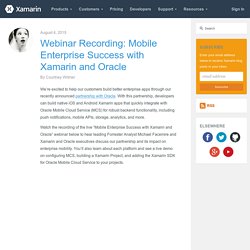
With this partnership, developers can build native iOS and Android Xamarin apps that quickly integrate with Oracle Mobile Cloud Service (MCS) for robust backend functionality, including push notifications, mobile APIs, storage, analytics, and more. Watch the recording of the live “Mobile Enterprise Success with Xamarin and Oracle” webinar below to hear leading Forrester Analyst Michael Facemire and Xamarin and Oracle executives discuss our partnership and its impact on enterprise mobility. You’ll also learn about each platform and see a live demo on configuring MCS, building a Xamarin Project, and adding the Xamarin SDK for Oracle Mobile Cloud Service to your projects.
View the presentation slides for this webinar here. Visit xamarin.com/oracle for more information about our partnership and to download the Xamarin SDK for Oracle Mobile Cloud Service. Building Apps: Native, Web, or Hybrid? How will you deliver your mobile apps: native, web or hybrid?
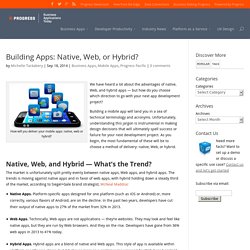
We have heard a lot about the advantages of native, Web, and hybrid apps — but how do you choose which direction to go with your next app development project? Building a mobile app will land you in a sea of technical terminology and acronyms. Unfortunately, understanding this jargon is instrumental in making design decisions that will ultimately spell success or failure for your next development project. As you begin, the most fundamental of these will be to choose a method of delivery: native, Web, or hybrid. Xamarin, Oracle Partner on Enterprise Mobility. Top 5 Cross-Platform App Development Tools - Avocarrot. Xamarin Helps Enterprises Build An App For That. Xamarin 3 Breaks New Ground in Native Mobile App Development.
SAN FRANCISCO--(BUSINESS WIRE)--Xamarin, the company that empowers more than 600,000 developers to build fully native mobile apps for iOS, Android and Windows, today announced the availability of Xamarin 3.
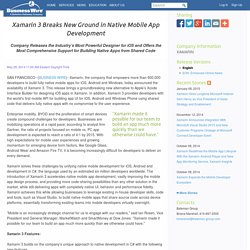
This release brings a groundbreaking new alternative to Apple’s Xcode Interface Builder for designing iOS apps in Xamarin. In addition, Xamarin 3 provides developers with the world’s first mobile API for building app UI for iOS, Android and Windows Phone using shared code that delivers fully native apps with no compromise to the user experience. “Xamarin made it possible for our team to build an app much more quickly than we otherwise could have.” Enterprise mobility, BYOD and the proliferation of smart devices create compound challenges for developers. Businesses are mobilizing operations at a rapid pace; according to analyst firm Gartner, the ratio of projects focused on mobile vs. Which Cross-Platform Tool Works Best for Your Enterprise App Development?
The number of new apps released every month is overwhelming.
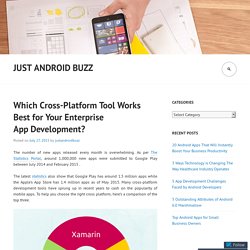
As per The Statistics Portal, around 1,000,000 new apps were submitted to Google Play between July 2014 and February 2015 . The latest statistics also show that Google Play has around 1.5 million apps while the Apple’s App Store has 1.4 million apps as of May 2015. Many cross-platform development tools have sprung up in recent years to cash on the popularity of mobile apps. To help you choose the right cross platform, here’s a comparison of the top three. Pros and Cons of Cross-platform Mobile Development Frameworks. In the Comparing Mobile Development Framework Types article, we explored the two main general Mobile Framework types and went through each one's pros and cons.
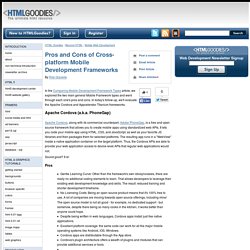
In today's follow-up, we'll evaluate the Apache Cordova and Appcelerator Titanium frameworks. Apache Cordova (a.k.a. PhoneGap) Cross-Platform Mobile App Development Tools. The mobile app market is increasingly demanding cross-platform support from apps.
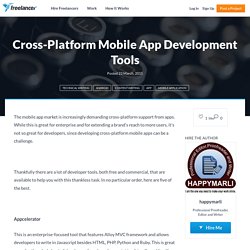
While this is great for enterprise and for extending a brand's reach to more users, it's not so great for developers, since developing cross-platform mobile apps can be a challenge. Thankfully there are a lot of developer tools, both free and commercial, that are available to help you with this thankless task. In no particular order, here are five of the best.
Appcelerator This is an enterprise-focused tool that features Alloy MVC framework and allows developers to write in Javascript besides HTML, PHP, Python and Ruby. PhoneGap Probably the best-known cross-platform development tool within the community, PhoneGap is based on the open source Apache Cordova project. Whoop This might be a controversial choice. RhoMobile. Why You Should Choose Xamarin For Your Next Enterprise App? Xamarin: Cross Platform Mobile Apps Development Tool The mobile world is evolving.
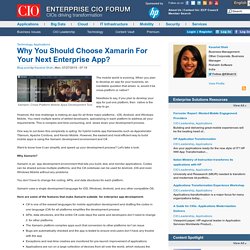
When you plan to develop an app for your business, an inevitable question that arises is, would it be cross-platform or native? Needless to say, if you plan to develop your app for just one platform, then native is the way to go. Xamarin Cross-Platform Mobile Application Development. Posted in - Mobile App Date - 17 Mar. 2015 Cross platform mobile development is a technique to write codes/single codebase for applications that can be used on distinct operating systems.
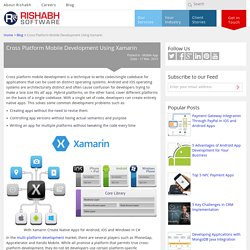
Android and iOS operating systems are architecturally distinct and often cause confusion for developers trying to make a ‘one size fits all’ app. Hybrid platforms, on the other hand, cover different platforms on the basis of a single codebase. With a single set of code, developers can create entirely native apps. This solves some common development problems such as: Creating apps without the need to revise themControlling app versions without losing actual semantics and purposeWriting an app for multiple platforms without tweaking the code every time.